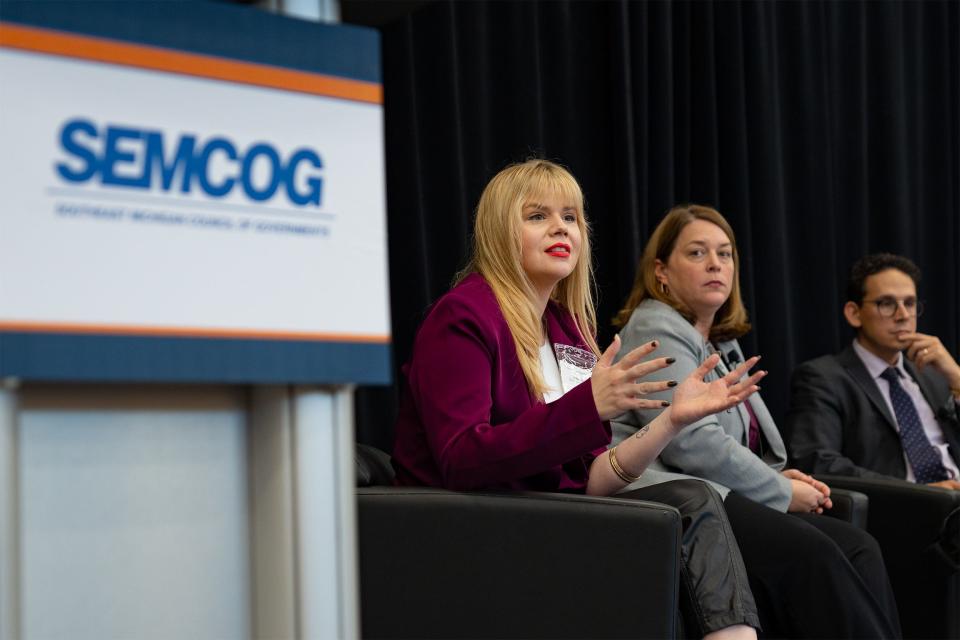Michigan growth council leaves questions about what's next
- Oops!Something went wrong.Please try again later.
Gov. Gretchen Whitmer kicked off the year with her annual policy address to lawmakers warning them it will take more than the benefits of living near family to keep young people in Michigan. Now she has in her hands a laundry list of ideas aimed at convincing them to stay in Michigan and others to join them.
Whitmer created and charged the "Growing Michigan Together Council" with identifying strategies for reversing Michigan's sluggish population growth. The group approved its final recommendations Thursday, laying out a range of proposals from investments in "regional innovation districts" to lowering the costs of higher education as well as child and elder care.
Demographic, economic and public policy experts say the council did a good job diagnosing the problems holding Michigan back. The group put forward some solutions worth pursuing but did not provide a clear path for implementing them, experts say. If Whitmer began the year with a call to action on population growth, her council's conclusion ends the year with a question: Will its report and the ideas it contains sit on a shelf collecting dust or will officials and community leaders put the plan in motion?
"I think it's laid out a good starting point — not a road map by any stretch," said demographer Kurt Metzger, director emeritus at Data Driven Detroit. "Now the hard part begins." Which recommendations should leaders prioritize and how will they measure whether they're working?, Metzger asked.

Which population growth ideas will leaders pursue?
With the growth council's recommendations in hand, state leaders could start with any number of the proposals laid out in the report: a study into developing a passenger rail line between Grand Rapids and Detroit or considering ways to expand Michigan's public education system to include two years of tuition-free postsecondary education.
But experts met one of the council's ideas with skepticism: a proposal to test out incentives to lure workers from other states to Michigan. Some regions and states in the U.S. do this already, offering relocation and home down-payment support and relief for student loan debt largely targeting workers in high-wage jobs.
The Whitmer administration's economic development strategy includes giving taxpayer dollars to companies that create jobs in the state. Will the governor and other state leaders also give money to people who move to Michigan to work?
Hannah Kling — an assistant professor of data analytics and economics at Belmont Abbey College who studied Michigan population growth in a report for the Mackinac Center for Public Policy — poured cold water on the idea.
She says it's not supported by research. "That doesn't feel really good either like, 'Oh, we're going to tax the people in Michigan — some of whom maybe don't have college degrees — and we're going to give money to these fancy, well-educated people from the coasts or something because we think we need a bunch of people with Ph.D.s to make our place successful,'" Kling said.
Citizens Research Council of Michigan Executive Director Eric Lupher also wondered how long someone paid to live in Michigan would stay. "People want a quality of life, right? So you offer an incentive to come here. And then I come and I see that the schools are failing to do as well as the U.S. average and the roads are full of potholes and on and on and on everything you know is wrong with Michigan," he said. It might make more sense to use money for any incentive program to lure new workers instead to make Michigan a better place to live, Lupher said.
Meanwhile, what will happen to the ideas sought by some to grow Michigan's population not included in the council's report? During a speech this summer, Whitmer called on lawmakers to pass a paid family and medical leave policy, saying it will grow Michigan's population. "Surveys show paid leave is one of the top three policies that people prioritize when deciding where to relocate. A majority of adults who plan to move in the next two years would be more likely to go somewhere with it," she said. The council did not include paid leave among its recommendations.
Finding the money to pay for new growth policies
The council's report contains scattered references to underinvestment in Michigan's infrastructure, roads, local community development and schools. It also documents how public spending in Michigan lags behind other states and highlights Michigan's relatively low taxes.
But the report doesn't specifically call for raising taxes to increase revenue. Tax proposals — the council recommends — should be carefully considered only after efforts to make state spending more efficient, bring in federal dollars and tap the private sector and philanthropy for support.

Fund MI Future — a group focused on achieving fair funding for public services in Michigan — has argued revenue increases are necessary to grow the state's population.
"They failed to address the obvious," MoReno Taylor II, the group's executive director, said of the council's final report. "That in order to achieve the rosy vision of the state that was laid out here that we have some funding challenges that we need to look at." He called the council's call on the governor and state lawmakers to only consider changes to tax policy after exhausting current resources "extremely sad and frustrating."
Meanwhile, GOP legislative leaders predict the council's recommended proposals will cost billions. They noted that the commission did not recommend tax hikes, they raised concerns that Democrats will pursue them anyway. Tax increases will stymie Michigan's growth, they said.
"We can't spend our way out of our problems," said House Minority Leader Matt Hall, R-Richland Township.
Michigan population growth: Incentives, free education, public transit recommendations from Whitmer growth council
Measuring success
Asked what it will look like for the council to have been a success, the group's leaders said ahead of the report's release they'll be looking to see the reaction to the recommendations, what Whitmer says in her upcoming State of the State address and the work Michigan's new chief growth officer undertakes.

But the council's report also puts forward specific benchmarks for Michigan to hit by 2050. By then, "Michigan will be a top-ten state for population growth," it states. It sets goals for Michigan to be in the top 10 states for median household income, "net talent migration" and postsecondary attainment.
But Metzger urged not to wait until then to see whether Michigan is making progress. He called for measuring success along the way and recognizing when strategies for growing the state's population aren't working.
Contact Clara Hendrickson: chendrickson@freepress.com or 313-296-5743. Follow her on X, previously called Twitter, @clarajanehen.
This article originally appeared on Detroit Free Press: Michigan population council leaves questions on next steps

